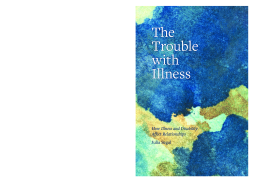
Additional Information
Book Details
Abstract
This impressively honest book explores the effects a challenging disability or illness can have on the mind and personal relationships, and how friends, family and professionals can help.
Illness or disability can isolate people by creating vast differences in their experiences where previously there were none. Friends and family can find themselves saying the wrong thing or awkwardly avoiding topics as a result. This book takes a candid look at how discomfort caused by an illness can strain a relationship between partners, families and professionals, as well as how understanding feelings of guilt or shame can transform a situation or relationship.
The insights and advice offered in this book can help children and adolescents overcome anxiousness caused by a parent's condition, improve communication between partners and family members, and increase professionals' awareness of how a client feels about their situation.
Julia Segal has worked for 35 years as a psychoanalytically-informed counsellor, lecturer and trainer. She currently works as a counsellor for people affected by neurological and other physical health conditions in North West London.
Based on 35 years of experience, Julia Segal's book is an extremely important contribution to an issue that has or will touch many lives: the impact that illness has on relationships. A book that will not only be essential reading for professionals but should be read by all those trying to come to terms with the devastating impact of illness not just on the body but also on the mind.
Marcus du Sautoy, Simonyi Professor for the Public Understanding of Science at the University of Oxford and author of What We Cannot Know.
The Trouble with Illness" is an essential read for any health care professional. Julia clearly explains the multitude of reactions to illness and disability and provides practical methods to help manage them. "The trouble with illness" comes to me at a time in my life where I find myself both personally and professionally a carer and it provided me with a fresh insight into disability that was both revealing and comforting at the same time. Read it.
Susan Hourihan, Clinical Specialist Occupational Therapist, Queen Square University College London Hospital
Julia Segal has distilled a professional lifetime of working closely with people who are undergoing illness to produce this timely book. We hear a lot these days about integrating physical and mental health. By keeping her focus on the emotional experience of illness what Segal offers us is a perspective that helps us appreciate what the person undergoing illness has always needed from professionals before our healthcare system became so disintegrated.
We must all suffer illness, but not all of us are equipped to take up a vocation for caring for the ill. I expect that counsellors and psychotherapists who read this book to help them stay alongside people who are suffering illness will be immensely grateful for Segal's lightly worn learning and wisdom from experience, and her steadfast honesty and compassion.
Jeremy Clarke CBE, Research Fellow, LSE; expert member NICE guideline for Depression, 2009 & 2017 and former national adviser, IAPT, NHS England
A really sensitive and straightforward and yet comprehensive book. A great achievement on a really needed, under-acknowledged, yet massive and ever-present subject.
Lionel Roth, Husband and carer
Approximately 15 million people in the UK are living with long-term illnesses and resulting disability. Add to that number the families, the professionals working in this field, local communities and as a society we are facing an epidemic of guilt, frustration, anger, distress, fear and worthless. Julia Segal has brought to our shelves one of the most important books of this decade and will be of considerable value to those whose work or life brings them into contact with illness or disability. Julia's candid writing style, together with those who share their stories brings normality and hope to those dealing daily with abnormal situations. This book gives the reader courage to face those feelings and thoughts about illness we prefer to keep hidden and engenders hope that they can try again tomorrow.
Dr Anita Rose, Consultant Clinical Neuropsychologist
Chapter by chapter, Segal lays out the ways serious illness and disability can affect families and relationships, and suggests how those affected can be helped or help themselves. She gives vivid examples, and draws often on psychoanalytic ideas and insights, showing how useful they can be in helping us to understand the complexity of her subject. Counsellors and psychotherapists will find this book invaluable.
Jim Pye UKCP (Reg), psychotherapist
BACP
Table of Contents
| Section Title | Page | Action | Price |
|---|---|---|---|
| The Trouble with Illness: How Illness and Disability Affect Relationships by Julia Segal | 3 | ||
| Introduction | 9 | ||
| Chapter 1. Why Does Anything Have to Change? | 24 | ||
| Chapter 2. Inner World/Outer World | 44 | ||
| Chapter 3. Understanding | 80 | ||
| Chapter 4. Will We Survive? | 104 | ||
| Chapter 5. Illness, Disability and Sexuality | 135 | ||
| Chapter 6. Pain | 156 | ||
| Chapter 7. Grieving | 177 | ||
| Chapter 8. Damage to Capacities to Think or Feel | 196 | ||
| Chapter 9. Parents | 208 | ||
| Chapter 10. Children | 237 | ||
| Chapter 11. Relations with Professionals | 274 | ||
| References | 305 | ||
| Index | 308 | ||
| Blank Page |
